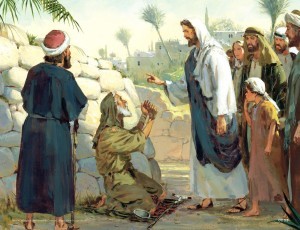Thirtieth Sunday of the Year – October 24, 2021
Jeremiah 31:7-9; Hebrews 5:1-6;
Mark 10:46-52
In the ancient Semitic world, a
name was not just a label to identify a person. A name expressed the
personality or destiny of a person. So what does Bartimaeus mean? Literally, it
comes from the Aramaic and means “son/person of defilement (tame’).” This could,
therefore, be a nickname given to him because he was a blind beggar. Popular
theology among the Hebrews held blindness to be a punishment from God for sin
or defilement (John 9:34). But the Greek version of the name could also be
understood as “son/person of honour” (timÉ). This would indicate the man’s
inner nature and destiny. By giving us the name Bartimaeus with its double
meaning, Mark could be telling us that here is a man who is supposed to be a
man of honour and dignity (timÉ) living in a state of dishonour and shame
(tame’). What Jesus did for him, therefore, was not simply restoring his
physical sight but, over and above that, restoring his God-given human dignity.
Mark in the gospel passage wants
to show his audience irony. At the beginning of the story, we saw a blind,
impoverished beggar sitting by the roadside and asking for help. He now reaches
out to Jesus. Jesus does show a contrast
here between his chosen disciples and the new disciple in the blind
beggar. While his handpicked disciples
were not physically blind and had seen Jesus in action for a long time they
were spiritually blind as they did not understand who Jesus really is or what
following him really means. They had never used the title Son of David at any
time while addressing Jesus. On the
other hand, the lowly blind beggar seems to know who Jesus really is even
before he gets back his physical sight and almost immediately undergoes the
kind of transformation that makes him a faithful disciple of Jesus. He became a
person with a new spiritual vision along with his physical vision and he chose
to be with Jesus as his disciple. Thus
at the end of the story, we have a man who can see, has vision, who knows very
clearly where he is going and where he should be going.
On the other hand the request of
the blind man is a model prayer for us: the Christian Prayer, the Prayer of
Petition. We ask the Lord in faith for something we need and the Lord will
grant it to us. Perhaps Jesus had seen
the blind beggar several times as he went about preaching and he must have been
busy collecting alms from people. Only when he opened himself in faith and
asked the Lord for healing did he receive that gift and the greater gift to be
his disciple. Like Bartimaeus, we too
may be busy sometimes collecting petty alms and paltry donations and have not
collected the real graces from the Lord. This episode is a summary of the
Christian's life and pilgrimage. While
physical sight is desirable, spiritual sight is an absolute necessity for our
salvation. In order to have this
spiritual sight, we must pray to Jesus and say, Lord, my Teacher, let me see
again. Only when we receive spiritual
sight, we come to know and understand that "the wisdom of this world is
foolishness with God." As Christians, we must have our eyes opened to the
meaning of life if we are to undergo a radical conversion experience that gives
new direction to all we are and do. He
believed in the word of God which was revealed to him internally that this man
was the Son of God and was healed.
(You are most welcome add your thoughts
and reflections in the comment section below)
Happy Sunday


No comments:
Post a Comment